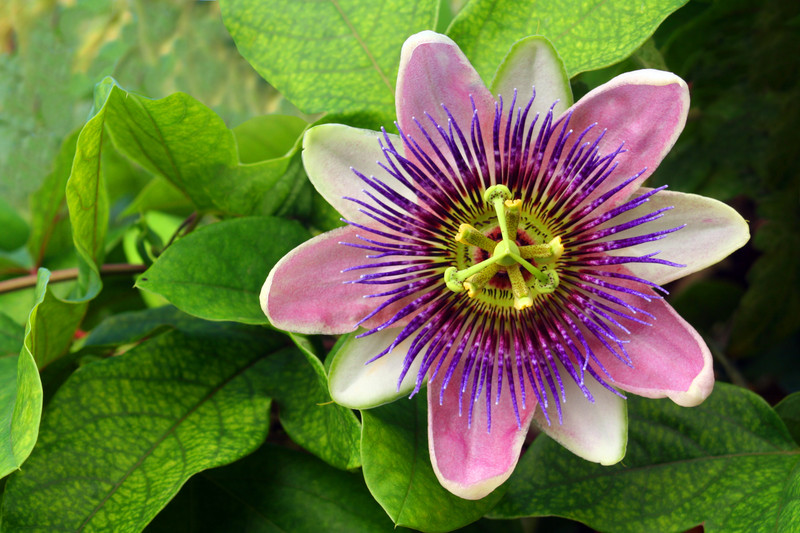Passion flower is an herb which is recognizable not just for its lovely name, but for its soothing effects. Here we look at the natural origins of this precocious plant, and then examine how its effects could be of significant benefit to you.
What Is Passion Flower?
Passion flower, and more specifically the type named Passiflora incarnata, is a perennial vine native to the southeastern parts of the U.S., and it is now grown throughout Europe and the U.S. This unique and long-lasting vine has a robust wooden stem which can grow up to 10 meters in length. Shoots grow along this vine, which produce flowers with white petals and magenta sepals. (Other species of Passiflora produce fruit, called passionfruit).
The flowers, leaves, and stems of Passiflora incarnata are used medicinally, and have been for centuries since Spanish explorers first harvested it. (The moniker “passion” is inspired by the flower’s resemblance to the crown of thorns worn by Christ, as per the observation of the Spanish.) The predominant historical use of passion flower is as a sedative. However, a variety of other uses have been attributed to passion flower. Its usage has carried over into modern herbal medicine, and rightly so. Passion flower can be of certain benefit in the context of various ailments such as anxiety, insomnia, and more.
Benefits of Passion Flower
The natural properties of passion flower, and its interactions in the body, make it a prime herbal supplement for general relaxation. Here, we take a look at some of the ideal and most touted uses of passion flower.
Mitigating anxiety is one of the most prominent potential benefits of a passion flower supplement. The anxiety-reducing properties of passion flower result from interactions it has with neural receptors in the brain. It bolsters the production of gamma-aminobutyric acid (GABA), a neurochemical which facilitates physiological relaxation. One study supports the use of passion flower for mitigating the symptoms of generalized anxiety, with minimal side effects. Other research supports this benefit specifically in individuals who were scheduled for surgery. Passion flower is worth considering for those who experience anxiety.
Treating insomnia: Multiple studies have shown a link between passion flower and improved sleep. Research has been encouraging for use among those with insomnia, and among those with bipolar disorder. Passion flower’s sleepy benefits are believed to result from its effect on anxiety.
Treating menopause: The GABA-producing effects of passion flower make it potentially effective at mitigating depression and anxiety occurring in women who are menopausal. Studies show passion flower can do this also on account of reducing monoamine oxidase, an effect that is comparable to that of some pharmaceutical antidepressants. Furthermore, passion flower could also help reduce hot flashes, night sweats, and headaches that occur during menopause.
Physiological issues resulting from stress could potentially be treated by taking passion flower. Certain ailments such as hypertension (high blood pressure), some gastrointestinal issues, and even asthma can result from excessive stress or anxiety. By reducing anxiety, passion flower could help mitigate these issues in some people.
If you are anxious or in need of a natural relaxant, then you should consider a passion flower supplement. It can be an effective herbal aid in multiple contexts, as explained above. It’s recommended that you talk to your healthcare provider first before trying passion flower, even on a limited basis.

